

Facebook Publishing Users’ Private Location Data. Many Facebook users have noticed the recent change where some posts are now displaying the location of the user who submitted the post.
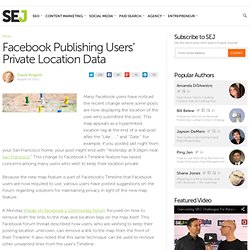
This map appears as a hyperlinked location tag at the end of a wall post after the “Like . . .” and “Date.” For example, if you posted last night from your San Francisco home, your post might end with “Yesterday at 9:18pm near San Francisco.” Facebook pulls location-tracking feature. PostPref: A Facebook App to Help Manage Photo Privacy. A number of years ago, Daniel Howe and Helen Nissenbaum at New York University developed and released TrackMeNot, a lightweight Firefox browser extension that protects users against search data profiling by issuing randomized queries to popular search-engines with fake data.
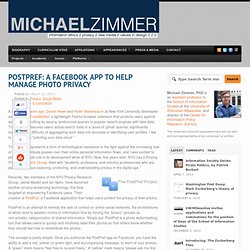
TrackMeNot obscures users’ actual search trails in a cloud of ‘ghost’ queries, significantly increasing the difficulty of aggregating such data into accurate or identifying user profiles. I like to refer to it as “polluting your data cloud.” TrackMeNot represents a form of technological resistance in the fight against the increasing loss of control individuals posses over their online personal information flows, and I was excited to play a very small role in its development while at NYU. Now, five years later, NYU has a thriving Privacy Research Group, filled with “students, professors, and industry professionals who are passionate about exploring, protecting, and understanding privacy in the digital age.” Facebook Places location-aware service launches in UK. 17 September 2010Last updated at 10:44 The service allows users to see where friends are, near and far.
“Photo Memories” Coming to Facebook Places? While checking into a Facebook Places location recently, one Mashable reader noticed a new tab: Photo Memories.
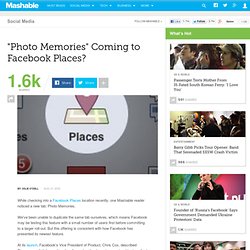
We've been unable to duplicate the same tab ourselves, which means Facebook may be testing this feature with a small number of users first before committing to a larger roll-out. But this offering is consistent with how Facebook has presented its newest feature. At its launch, Facebook's Vice President of Product, Chris Cox, described Places as a digital repository for all your location-based memories. He described a couple's children being able to use Facebook Places data to pinpoint the spot of their parents' first kiss, for example. But a large part of how we store our memories on Facebook and on the larger web is via images and photographs. Huge Facebook Places Backlash Spreads Through Status Updates.
Facebook Places launched earlier this month amid great fanfare, but right now it’s looking like fear and confusion over privacy concerns could derail the takeoff of the service.
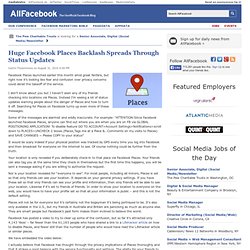
I don’t know about you but I haven’t seen any of my friends checking into locations via Places. Instead I’m seeing a lot of status updates warning people about the danger of Places and how to turn it off. Zuckerbandits? Alleged 'Facebook' burglars busted. It may be finally occurring to people that telling lots of strangers online that you're not home--and telling them where you live--is not necessarily very smart.

According to several local news outlets in Nashua, N.H., police say they've arrested three young men allegedly responsible for about 50 burglaries in the city last month. More specifically, TV station WMUR notes that the suspects "used social-networking sites such as Facebook to identify victims who posted online that they would not be home at a certain time. " It sounds a whole lot like an experimental site called PleaseRobMe.com , which aggregated public "check-ins" from geolocation services as a statement about just how many people online are letting the world know when they aren't home.
And, indeed, many people are on vacation in August and are more than happy to tell the world they're getting away from work for a few weeks. Facebook reveals the details behind Places. Facebook just confirmed the rumors that it’s launching a new location check-in feature.
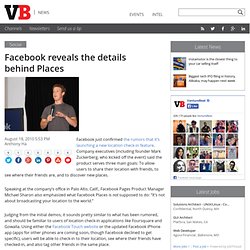
Company executives (including founder Mark Zuckerberg, who kicked off the event) said the product serves three main goals: To allow users to share their location with friends, to see where their friends are, and to discover new places. Facebook Places location-aware service launches in UK. Facebook eyes mobile domination. 3 November 2010Last updated at 23:32 By Maggie Shiels Technology reporter, BBC News, Silicon Valley More than 200 million people are now using Facebook across various mobile platforms Facebook has set out a strategy it hopes will make it as dominant in mobiles as it is in social networks.
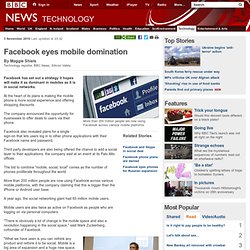
At the heart of its plans is making the mobile phone a more social experience and offering shopping discounts. The company announced the opportunity for businesses to offer deals to users via their phone. How will Facebook's geo-location impact on privacy? Last week, Facebook introduced its Places feature in the US, with more countries such as Ireland to follow.
This will bring it into direct competition with Foursquare, a mobile app service that allows you to ‘check in’ at locations like restaurants, which has significant appeal for advertising and B2B services. Geo-location represents the most exciting development in the mobile internet and its importance was demonstrated by Google’s decision last week to create 200 jobs in Dublin to focus on location. Facebook, whose offices are nearby, employs over 100 people working on usability and business. Facebook Places: Does it Have the Location-Sharing Secret Sauce? - PCWorld. Does Facebook Places have what it takes to rule the location-sharing space?
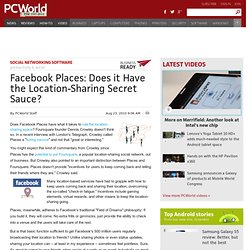
Foursquare founder Dennis Crowley doesn't think so. In a recent interview with London's Telegraph, Crowley called Places a "boring service" and not that "great or interesting. " You might expect this kind of commentary from Crowley since Places has the potential to put Foursquare, a popular location-sharing social network, out of business.
But Crowley also pointed to an important distinction between Places and Foursquare. Marketing Experiments Emerge Using Facebook Places. A little over a month after Facebook made its long-awaited entrance into the location space with Places, experiments from advertisers and local businesses looking to market via check-ins are starting to emerge.
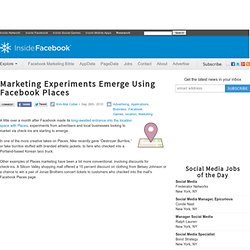
Privacy Invasive Devices. Faster than privacy by design, privacy invasive tools are designed.
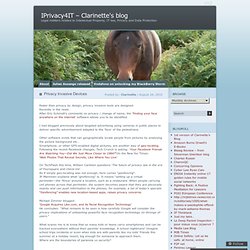
Recently in the news: After Eric Schmidt’s comments on privacy / change of name, the ‘Finding your face anywhere on the internet‘ software allows you to be identified. I had blogged previously about targeted advertising using cameras in public places to deliver specific advertisement adapted to the ‘face’ of the pedestrians. Other software exists that can geographically locate people from pictures by analysing the picture background etc… Smartphone, or other GPS-enabled digital pictures, are another way of geo-locating. Following the recent Facebook changes, Tech Crunch is asking: ‘Your Facebook Friends Are Watching You—Did We Just Move Closer to 1984? “On the New Yor Times:‘Web Photos That Reveal Secrets, Like Where You Live’ On TechFlash this time, William Carleton questions ‘The future of privacy law in the era of Foursquare and check-ins‘ As if simply geo-locating was not enough, here comes “geofencing“. Facebook Publishing Users’ Private Location Data.
Where are Twitter and Facebook’s Geolocation Features? I’ve been playing around with Google Latitude on and off since this morning. I must admit, it’s pretty cool and demonstrates why geolocation is interesting, and services like Loopt and BrightKite have found some success as early players in the space. But as myself and a lot of other commenters have noted, the problem with Latitude is that Google contacts really aren’t your actual social network in most cases, primarily because of the quirky way in which Gmail adds people to your buddy list. Nonetheless, Google Latitude has me thinking about geolocation again, and more aptly, why the big social networking players – Facebook, MySpace, and Twitter – aren't doing anything with it. Why It Would Be Great Facebook, and to a lesser extent Twitter (and formerly MySpace … it still is for lots of other people), is an actual representation of my social network.
Huge Revenue Opportunity Startups Could Beat Them to the Punch. Facebook Privacy: 6 Years of Controversy [INFOGRAPHIC] Alexander Hotz is a freelance multimedia journalist and public radio junkie based in New York City. Currently he teaches digital media at Columbia University's Graduate School of Journalism.
Follow Alex on Twitter at @hotzington. Your Facebook Friends Are Watching You—Did We Just Move Closer to 1984? George Orwell’s novel 1984 begins with Winston Smith, the main character, seeing posters saying BIG BROTHER IS WATCHING YOU. In 2010, that could be replaced with FACEBOOK IS WATCHING YOU. Or rather, YOUR FRIENDS ON FACEBOOK ARE WATCHING YOU. You and your friends can now post where you are and share this information, if you so chose. The Confusing Stages Of Opting Into Facebook Places.